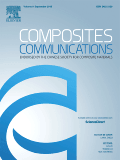
Composites Communications
Scope & Guideline
Pioneering Research in Composites and Beyond
Introduction
Aims and Scopes
- Pedagogical Innovations:
The journal emphasizes research that explores new pedagogical methods and approaches in writing and rhetoric, particularly those that challenge traditional norms and promote inclusivity. - Cultural Rhetorics:
A significant focus is on cultural rhetorics, examining how different cultural narratives and histories inform writing practices and pedagogies. - Community Engagement and Activism:
The journal encourages research that connects writing instruction with community engagement, emphasizing the role of writing as a tool for social change and activism. - Intersectionality in Writing Studies:
Research that examines the intersections of race, gender, and other identities within writing and rhetoric is a core area, highlighting the importance of diverse perspectives in the discipline. - Emotional and Reflective Writing:
The journal also explores the emotional dimensions of writing and how reflective practices can enhance learning and engagement in writing contexts.
Trending and Emerging
- Antiracist Pedagogy:
There is a growing emphasis on antiracist pedagogies, as scholars explore how writing instruction can combat systemic racism and promote equity in educational settings. - Digital Literacies and Technology:
Research focusing on digital literacies, including the impact of technology on writing practices and instruction, is increasingly prominent, reflecting the digital transformation of education. - Community-Based Writing Practices:
Emerging themes include the exploration of community-based writing practices that connect students and educators with local communities, aiming to foster social change and civic engagement. - Mental Health and Writing:
The intersection of mental health and writing is gaining traction, with research investigating how writing can serve as a therapeutic tool and support emotional well-being. - Decolonial and Indigenous Frameworks:
There is a rising interest in decolonial and Indigenous frameworks within writing studies, as scholars seek to reclaim narratives and practices that have historically been marginalized.
Declining or Waning
- Traditional Rhetorical Theories:
There has been a noticeable decrease in publications centered solely on traditional rhetorical theories, as newer frameworks and approaches gain traction in the field. - Purely Technical Writing Studies:
Research focused primarily on technical writing without consideration of cultural or social contexts appears to be less frequent, indicating a shift towards more holistic approaches. - Generalized Writing Assessments:
Themes surrounding generalized or standardized writing assessments are declining, as the field moves towards more nuanced and context-sensitive evaluations of writing.
Similar Journals

ACS Materials Au
Exploring the Frontiers of Materials ScienceACS Materials Au, published by the American Chemical Society, is a premier open-access journal that has been at the forefront of materials science since its inception in 2021. With an ISSN of 2694-2461, this journal encompasses an expansive range of topics including biomaterials, electronic, optical and magnetic materials, materials chemistry, and polymers and plastics, consistently achieving Q1 rankings in these categories for 2023. The journal is based in the United States and operates from the AMS's headquarters in Washington, DC, offering significant visibility and a robust platform for researchers. The journal's commitment to open access ensures wide dissemination of groundbreaking research, enabling a diverse audience—including researchers, professionals, and students—to engage with the latest advancements in materials science. With an encouraging impact factor and a focus on novel materials and innovative applications, ACS Materials Au stands as a vital resource for anyone devoted to understanding and advancing the frontiers of materials engineering and science.
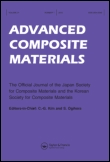
ADVANCED COMPOSITE MATERIALS
Shaping the Future of Mechanical Engineering with CompositesADVANCED COMPOSITE MATERIALS, published by Taylor & Francis Ltd, is a leading peer-reviewed journal in the field of materials science, specifically focusing on the innovative development and applications of composite materials. With an ISSN of 0924-3046 and E-ISSN 1568-5519, this journal serves as a vital resource for researchers and professionals worldwide, examining cutting-edge advancements and methodologies in composites, ceramics, and mechanical engineering. Having secured a solid standing in the academic community, it boasts impressive Scopus rankings, such as #185 in Mechanical Engineering with a 72nd percentile and #46 in Ceramics and Composites, emphasizing its relevance and rigor. Although not an open-access publication, its insights are invaluable for those looking to explore, contribute to, and stay abreast of the latest breakthroughs in the field from 1991 through 2024. By targeting critical areas within mechanics and material sciences, the journal continues to foster innovation and scholarly discussion, making it an essential venue for specialists striving to advance the capabilities and applications of composite materials.
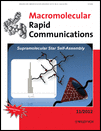
MACROMOLECULAR RAPID COMMUNICATIONS
Connecting Researchers with Cutting-Edge Macromolecular ResearchMACROMOLECULAR RAPID COMMUNICATIONS, published by WILEY-V C H VERLAG GMBH in Germany, is an esteemed journal dedicated to the rapid dissemination of high-quality research in the fields of materials chemistry, organic chemistry, and polymers and plastics. With a remarkable 2023 impact factor securing its place in the prestigious Q1 category across three key disciplines, the journal ranks impressively within the top quartiles of the Scopus metrics, standing at 36th in organic chemistry and 35th in polymers and plastics. Although the journal does not offer open access options, its informative depth and innovative research make it an invaluable resource for researchers, professionals, and students seeking to stay abreast of the latest developments in macromolecular science. Covering a broad spectrum of topics from fundamental research to applications, MACROMOLECULAR RAPID COMMUNICATIONS aims to foster collaboration and inspire further advancements within the scientific community.
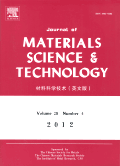
Journal of Materials Science & Technology
Driving Research in Multidisciplinary Materials ScienceThe Journal of Materials Science & Technology, published by JOURNAL MATER SCI TECHNOL in China, is a leading forum for the latest research in the multidisciplinary field of materials science. With the ISSN 1005-0302 and E-ISSN 1941-1162, this esteemed journal boasts an impressive impact factor and has established itself as a vital resource for professionals, researchers, and students alike. Covering a wide range of topics, including ceramics, composites, materials chemistry, mechanical engineering, and polymers, it has achieved a coveted Q1 ranking in multiple categories as of 2023, reflecting its position in the top tier of scholarly publications. Notably, the journal excels in its Scopus ranks, placing within the top 5% in categories such as Metals and Alloys and Mechanical Engineering. Aiming to foster knowledge and innovation in material development and application, the journal is committed to facilitating groundbreaking research and collaborations that propel the field forward. With its convergence of insights from 1993 to 2025, the Journal of Materials Science & Technology remains an indispensable resource for the advancement of materials science.
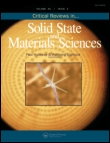
CRITICAL REVIEWS IN SOLID STATE AND MATERIALS SCIENCES
Elevating Knowledge Through Critical AnalysisCRITICAL REVIEWS IN SOLID STATE AND MATERIALS SCIENCES, published by Taylor & Francis Inc, is a prestigious journal dedicated to advancing the field of materials science through comprehensive reviews and critical analysis of existing literature. With an ISSN of 1040-8436 and an E-ISSN of 1547-6561, this journal serves as a vital resource for researchers, professionals, and students seeking in-depth understanding of solid-state phenomena and materials applications. Renowned for its high visibility in the academic community, it holds a Q1 ranking across multiple categories including Chemical Engineering, Condensed Matter Physics, and Physical and Theoretical Chemistry, showcasing its impact and relevance in the field. The journal spans its publication years from 1977 to 2024 and is highly regarded, holding prominent positions in Scopus rankings, making it a leading platform for disseminating critical insights and advancing knowledge in materials science. Although it is not an open-access journal, its rigorous peer-review process ensures the highest quality of articles, solidifying its status as a cornerstone for anyone engaged in materials research.
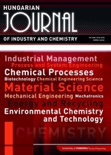
Hungarian Journal of Industry and Chemistry
Exploring the Intersection of Theory and PracticeHungarian Journal of Industry and Chemistry, published by UNIV PANNONIA, has long been a cornerstone in the fields of industrial and chemical research since its inception in 1974. With a focus on integrating innovative studies and applications within the chemical industry, this journal serves as a vital platform for researchers and practitioners aiming to disseminate their findings and advancements in both theoretical and practical domains. Although its coverage in Scopus has been discontinued post-2002, it continues to be an essential resource for students and professionals seeking insights into the transformative practices and developments in chemistry and industry. The journal's commitment to fostering academic discourse is reflected in its compelling array of articles, making it indispensable for anyone engaged in the evolving landscape of industrial chemistry.
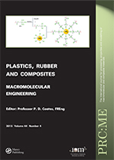
PLASTICS RUBBER AND COMPOSITES
Exploring Innovations in Polymers and CompositesPLASTICS RUBBER AND COMPOSITES is a leading academic journal published by SAGE Publications Inc., dedicated to advancing the understanding and application of polymers, plastics, and composite materials. With an ISSN of 1465-8011 and an E-ISSN of 1743-2898, this quarterly publication attracts a diverse readership from the fields of ceramics and composites, chemical engineering, materials chemistry, and polymer science. Currently indexed in the Q3 category across multiple relevant domains, the journal provides a platform for high-quality research and innovations that contribute significantly to material science. The journal's commitment to disseminating cutting-edge research makes it a valuable resource for researchers, industry professionals, and students who are eager to explore the latest developments and applications in this dynamic field. Despite its current non-open access status, the journal's rigorous peer-review process ensures that all published articles meet the highest academic standards, thus reinforcing its reputation as an essential source for scholarly work in the materials sector.
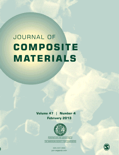
JOURNAL OF COMPOSITE MATERIALS
Driving Excellence in Composite Materials ResearchJOURNAL OF COMPOSITE MATERIALS, published by SAGE PUBLICATIONS LTD, is a premier academic journal dedicated to advancing the field of composite materials. With a long-standing history since 1967, this journal serves as a vital platform for researchers and professionals in the areas of ceramics and composites, materials chemistry, mechanical engineering, and mechanics of materials. The journal's impact is further underscored by its Q2 quartile ranking in various categories as of 2023, alongside notable Scopus rankings in multiple engineering and material science disciplines. Though it currently lacks Open Access options, its rigorous peer-review process ensures the high quality and relevance of its published research. This journal is instrumental in fostering innovation and promoting collaboration among academics and industry professionals, making it essential reading for anyone involved in materials science and engineering.

Advances in Materials Research-An International Journal
Connecting Researchers to the Future of Materials ScienceAdvances in Materials Research - An International Journal is an esteemed publication in the field of materials science, spearheaded by TECHNO-PRESS. Established to provide a critical platform for the dissemination of high-quality research, this journal focuses on a broad spectrum of topics, including Biomaterials, Ceramics, Composites, Electronic, Optical, Magnetic Materials, Metals, Alloys, and Polymers. With a commendable impact factor reflecting its substantial contribution to the scientific community, Advances in Materials Research promotes innovative ideas through rigorous peer-review processes and supports the continuous advancement of materials research, particularly in the dynamic environment of South Korea. This journal, which holds impressive rankings across various subfields in the Scopus database, is designed to cater to the needs of researchers, professionals, and students aiming to stay at the cutting edge of materials science. By bridging gaps between theory and application, it invites contributions that push the boundaries of knowledge and technology in diverse material applications.
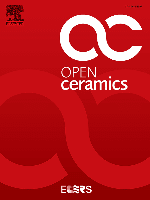
Open Ceramics
Fostering Open Access to Cutting-Edge DiscoveriesOpen Ceramics is a pioneering journal published by Elsevier, dedicated to the field of materials science, with a particular focus on ceramics and composites. Launched in 2020, this Open Access journal aims to facilitate unrestricted dissemination of cutting-edge research findings while promoting innovative developments in the utilization of ceramic materials across various applications. As of 2023, Open Ceramics has established a commendable presence in several key categories, achieving Q3 in Biomaterials and Q2 rankings in Ceramics and Composites, Electronic, Optical and Magnetic Materials, and Materials Chemistry. The journal's broad scope appeals to a diverse audience of researchers, professionals, and students interested in the advancements within this essential domain of materials science. With a commitment to quality and relevance, Open Ceramics provides a platform for rigorous peer-reviewed research, thereby enhancing the global dialogue in the field and contributing to the ongoing progress of materials innovation.